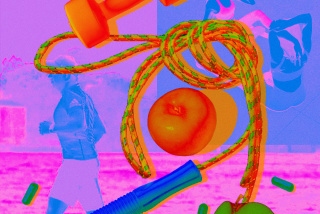Diet advice that goes against the grain
You’ve heard about the “Wheat Belly” diet, right? Well, technically, it doesn’t exist.
Dr. William Davis points out that the word “diet” does not appear on either the cover of his bestselling “Wheat Belly” book published in 2011 or on the follow-up, “Wheat Belly Cookbook,” which was published last month and already tops bestseller lists.
And that omission is intentional, Davis said.
“Wheat Belly” is about stripping your plate of a substance that contributes to heart disease, causes joint pain, inflammation, foggy thinking, bloating and much more, Davis said. Losing weight, he added, is simply a nice aside.
The cardiologist believes wheat is the single biggest contributor to the country’s obesity epidemic, in part because aggressive breeding methods and genetic manipulation have turned it into what Davis derides as a “Frankenwheat.” One of its most troubling side effects? Triggering uncontrollable carb cravings, the doctor said.
Why do you believe wheat is so problematic?
The advice to cut your fat and eat whole grains is the worst advice you can possibly pass on to people. I say, “Eat more fat. Eat as little grains as possible.” Grains really don’t belong in the human experience.
I didn’t go looking to demonize wheat. I told my patients to stop eating [wheat products] as part of treatment because many were suffering from diabetes or were prediabetic. But they’d come back in three to six months, and they were 25 to 40 pounds lighter. And they’d say, “The pain in my wrist and shoulder is gone.” “My [irritable bowel syndrome symptoms] are gone.” I only did it for blood sugar. But I thought, “What in the world is in wheat besides its potential to raise blood sugar? Why would their asthma go away? Why would someone’s food obsession disappear?” So many things happened. In the beginning I had no idea why. I had to see it thousands of time before it got drilled into my head. We are treating the consumption of modern wheat. Only we call it hypertension. Obesity. Arthritis. Acid reflux. … You take out the wheat, all that goes away. You could argue that wheat is perfectly crafted to exert maximum damage to multiple organs.
Your books make ditching wheat sound like discovering the fountain of youth.
I tell people just try it for 30 days. It’s an exceptionally common observation for people to come back to me and say, “I feel 20 years younger!” For one, you’ll have a dramatic increase in energy … and you experience what I call “youthful sleep.” That’s where [someone] can clang pots and pans and you won’t wake up. People lose weight, they’re more flexible, they’re lighter on their feet. Memory improves. Skin improves. The puffy look around the eyes? That improves. When you lose the wheat, you lose several pounds the first week. Part of that is fat weight, but also water weight.
This is a lot for people to wrap their heads around. We’ve been told grains are good.
What humans have been doing for 2 million years is consuming animal meat, vegetables, nuts, fruits and the like. ... When we added grains 10,000 years ago, more or less, there’s an observation of dramatic downturns in health. ... We are meat-consuming omnivores who made a mistake by this detour into grains. Modern times made it much worse by changing grains on us. [And agri-business] has decided, “Let’s just put wheat in everything, from tomato soup to salad dressings.” Why is wheat in tomato soup? When you make tomato soup at home, do you put wheat in it? No. I know this sounds conspiracy-ish, but I’ve got to believe that at some level some very smart people have realized [that wheat triggers binge eating]. How else can you justify that wheat got into everything?
You say that many “Wheat Belly” followers feel a profound sense of relief — and not just because of the weight loss.
We’re told that Americans are diabetic and overweight because we’re the most gluttonous and lazy people in the world. But that’s not true. Many have just been getting seriously bad advice. They are exercising, cutting their calories, doing all the things they are supposed to do, and there is this destructive thing in their diet that they are told to eat more of. Not only is that advice — to eat more grains — ineffective, it’s destructive.
You have people who are saying, “I’m doing everything right, I’ve cut my fat and cholesterol, I don’t eat junk food or fast food. I exercise an hour a day, or an hour and a half a day, and I’ve gained 18 pounds.” … They are doing what appears to be right, and yet they are desperately frustrated. But they have failed to make that fundamental distinction. It’s not about calories. It’s not about fat. It’s not about exercise. It’s about this destructive, appetite-stimulating food in your diet.
What is the hardest part about giving up wheat? And what should we be eating?
There is so much to eat! Real foods. Vegetables, fruit, meats, organ meats and so on. And when you are eating real foods, you can eat all you want. The hardest part for most people is giving up bread. And it’s not enough to just go gluten-free. I tell people, “You don’t have to give up sandwiches.” [The cookbook has several recipes for breads, including focaccia, pretzels, walnut-raisin bread, cheddar cheese biscuits, brownies and pie crusts, made with wheat substitutes such as almond, coconut and garbanzo bean flours.] I tell people just go cold turkey and try it for 30 days. What do you have to lose?
More to Read
Eat your way across L.A.
Get our weekly Tasting Notes newsletter for reviews, news and more.
You may occasionally receive promotional content from the Los Angeles Times.











